Beyond the Feud: Women, Power & Psychological Safety in Hip-Hop
- Crystal Jordan

- Oct 2, 2025
- 3 min read
By Crystal Jordan
Auesomely You Magazine
Published: 10/02/2025
Pillar Focus: Advocacy • Mental Health & Emotional Wellness
Pop Culture With Purpose

Why we’re writing this
Timelines are flooded with screenshots and subtweets between Nicki Minaj, Cardi B, and JT. Families and children are being dragged into it, and private pain is becoming a public spectacle. That’s not entertainment, it’s harm. At Auesomely You Magazine (AYM), we cover pop culture through an advocacy lens. This piece isn’t about who “won” a thread. It’s about what this moment reveals and how we can make something better from it.

The system that feeds on conflict
This isn’t only a “she said/she said.” It’s a culture problem with four engines:
The scarcity myth. Women in rap are still treated like there’s only one throne. Scarcity breeds rivalry and silences collaboration.
The conflict economy. Algorithms reward outrage: more quote-tweets, more comments, more reach. Labels and platforms profit from artists, who carry the emotional burden.
Misogyny & misogynoir. Black women and minority women in public face a double bind: be powerful and get punished for it, be quiet and get erased. When peers weaponize identity, the damage ripples to every girl watching.
Parasocial crossfire. Stan wars make fans believe defending an idol requires dehumanizing someone else. That’s not community—that’s group-think.
How public feuds harm health (and why that matters)
Chronic online conflict is a stressor. Even when you “log off,” your body remembers: disrupted sleep, irritability, anxiety, and burnout are common fallout of sustained digital harassment.
Weaponized shame lingers. Dragging children, parents, pregnancy, fertility, or trauma into discourse creates durable wounds for the target and the audience who share those identities.
Modeling matters. Young fans learn how to disagree by watching us. If humiliation is the template, healing never makes the stage.
This is not about fragility; it’s about psychological safety, a prerequisite for creativity, leadership, and community health.
What accountability could look like (without feeding the drama)
For artists (including Nicki, Cardi, JT—and anyone coming up)
No kids. No private health. No family trauma. Full stop. These are red lines, not debate points.
Name the system, not the woman. Critique labels, algorithms, radio politics without dehumanizing peers.
Pause > post. Use a 30-minute cooling rule, media training, or a trusted friend/manager to gut-check before you publish.
Redirect the moment. If you must address a slight, pair your statement with a resource scholarships for women producers, donations to girls’ music programs, or a panel on industry safety.
Choose the phone. Offline conflict-resolution prevents public pile-ons and protects everyone’s mental health.
For fans & stan communities
Protect don’t project. Uplift your fave’s work; don’t attack other women. Report doxxing/harassment on sight.
De-escalate your feed. Mute conflict keywords; follow creators who center craft, not cruelty.
Remember the humans. There are kids behind those last names and managers reading every notification.
For labels, managers & platforms
Set a code of conduct in contracts. Define lines (no minors, no health shaming) and attach consequences.
Provide always-on clinician access. Therapy stipends and crisis support should be standard, not perks.
Dial down the rage bait. Platforms can throttle recommender boosts on posts that target protected classes or minors.
Reward collaboration. BONUS payouts, playlisting, and campaign support when women co-create across camps.
The AYM Respect Playbook
Dignity is non-negotiable. Speak to work, not worth.
Kids and families are off-limits. Always.
No body/health/fertility slander. Period.
Disagree in private first. Then, if needed, issue a calm public note.
Redirect attention to solutions. Every call-out should include a call-to-care.
Log off to protect your peace. Rest is resistance.
What we’re calling for an open letter to Hip-Hop
We ask artists, managers, platforms, and press to join us in a simple pledge:
We will not weaponize trauma, children, or health.We will not profit from humiliating women.We will invest in psychological safety, equitable opportunities, and the next generation of girls who rap, write, produce, and lead.
Sign on? Email: info@auesomelyyoumag.com with subject AYM Pledge.
If you’re being targeted right now
Stop the spiral: screenshot, report, block, and delegate monitoring to a teammate.
Shrink the audience: turn off comments; post a brief boundary statement; do not trade barbs.
Care for the body: hydrate, move, breathe; schedule a session with a therapist or coach.
Resources: 988 Lifeline (US), Crisis Text Line (text HOME to 741741), Therapy for Black Girls directory, The Loveland Foundation.
What we want this moment to become
Imagine the headlines we could write: a Nicki x Cardi x JT cypher for girls’ music education; a joint statement that kids are off-limits; a tour where rival fanbases learn to stand side-by-side. The culture is watching. So are your daughters.
At Auesomely You Magazine, our north star doesn’t move: Seen. Heard. Celebrated. When women lead with advocacy, everybody wins.
Follow @AuesomelyYouMag for event highlights, inspiring features, and the heart of advocacy and celebration.
Want to write for Auesomely You Magazine?
Email us at writers@auesomelyyoumagazine.com
.png)



Comments